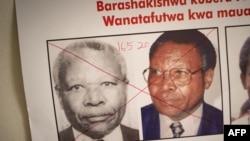Felicien Kabuga, an alleged financier of the 1994 genocide that claimed some 800,000 mainly Tutsi lives, is accused of helping to create the Interahamwe Hutu militia, the main armed group involved in the massacres, according to the United Nations.
He was arrested in May 2020 in a Paris suburb after 25 years on the run and is currently in detention in The Hague awaiting trial before the Mechanism for International Criminal Tribunals (MICT).
"Genocide survivors welcome the... ruling that Felicien Kabuga is fit to stand trial. Age and infirmity do not supersede the need for accountability," said Freddy Mutanguha, vice president of Ibuka, the main support group for survivors of the killings.
"Together with survivors of the genocide against the Tutsi everywhere, we look forward to justice being done," Mutanguha told AFP.
Various experts were involved in preparing the case, which "unequivocally demonstrates that Kabuga is in a vulnerable and fragile state and requires intensive medical care and monitoring," the MICT said Monday.
The MICT said it was in the interests of justice for the trial to begin as soon as possible in The Hague.
The opinions of independent forensic experts differed on Kabuga's fitness to stand trial, but they agreed that his condition could render him unfit in the future, the tribunal said.
He needs "24-hour nursing care" and currently resides in a prison hospital, it added.
Kabuga, a former president of the Radio Television Libre des Mille Collines (RTLM), which broadcast calls for the killing of Tutsis, is accused by the MICT of genocide, incitement to commit genocide and crimes against humanity.
MICT is completing the work of the disbanded International Criminal Tribunal for Rwanda.
Rwanda Survivors Hail Kabuga Trial

Rwanda's genocide survivors on Tuesday hailed a UN tribunal's decision to put Felicien Kabuga on trial, after his lawyers failed to halt proceedings against the 87-year-old on health grounds.
KIGALI —